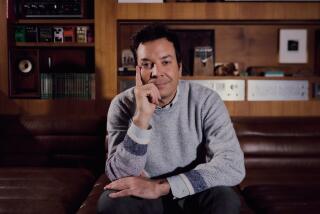Prime time’s script may get tossed
- Share via
NBC’s decision to move Jay Leno to 10 p.m. next fall sends a clear warning to viewers and to Hollywood that the expensive, scripted programs that have dominated prime time for decades may go the way of the Edsel.
Only time will tell whether NBC’s gambit is a stroke of programming genius or simply a way to avoid pushing the network’s biggest star into early retirement -- Leno has long been scheduled to turn over the “Tonight Show” desk to Conan O’Brien in June. But NBC believes it is introducing the network-television equivalent of a Prius or SmartCar into a prime-time lineup populated with Packards.
In recent years, scripted shows have been on the decline, replaced by cheaper game shows and reality fare. Now the broadcast networks -- ABC, CBS, NBC and Fox -- are bracing for what they expect to be a severely depressed year as automakers, the largest advertisers on TV, and other companies slash spending during the worst recession in decades.
At the same time, more consumers are using digital video recorders to watch their favorite shows so they can skip the commercials, threatening the 30-second spot, which has long paid the bills in television. Viewers are also shifting to the Internet.
The networks spend hundreds of millions of dollars annually in an inefficient research-and-development process to discover the next breakout hit. A series such as “Friends” or “CSI: Crime Scene Investigation” generates far more money than the cost of all of the clunkers along the way.
But production expenses have soared, and even the most popular prime-time comedies and dramas no longer are able to command audiences large enough for the networks to profit.
“Now the hits don’t pay for all of the failures, and the advertising community won’t pay for all failures either,” said Laura Caraccioli-Davis, an executive vice president of Starcom USA, a Chicago advertising agency.
Replacing dramas with Leno could cost jobs in Southern California. “This could put a lot of people in Hollywood out of work,” said Erik Sorenson, a former CBS News and MSNBC executive. “A lot more people work on five hours of scripted drama than on this one variety show.”
Although all the networks are finding it more difficult to make money, NBC is in particularly desperate straits. The network, owned by General Electric Co., has not launched a blockbuster since “Heroes” in 2006, and the writers strike, which ended earlier this year, wreaked havoc on NBC’s ability to develop shows. Its fall season immediately collapsed, with prime-time ratings plunging to a new low.
But talk is cheap: By moving Leno to 10 p.m. beginning in September, NBC no longer has to spend money producing new dramas for that time slot. Five nights of Leno’s show cost NBC less than $2 million. That’s the same amount NBC would spend for one hour of drama in prime time. So even if Leno’s ratings at 10 p.m. are lower than the competition, the network can still make money from the show.
“The threshold for this show is much lower than it would be for a scripted program,” said Marc Graboff, co-chairman of NBC Entertainment, who helped broker the deal with Leno.
“Broadcast television can never be the way that it has been for the last 50 years because of all of the structural changes going on in our industry,” Graboff added. “But we are offering something to our advertisers that is more innovative, and it’s a topical show, so that makes it somewhat digital-video-recorder-proof.”
Jason Maltby, a top buyer for advertising firm Mindshare, agreed. “It will be a success from an economic standpoint.”
NBC has a history of challenging industry practices, and that has only increased under NBC Universal Chief Executive Jeff Zucker. He led the campaign to shift Leno into prime time, a deal that came together Monday.
In some ways, Zucker might have been heading off what could have been a fiasco -- losing Leno to ABC or another rival. The longtime NBC star might have trounced Conan O’Brien in head-to-head late-night competition.
“This accomplished two goals,” Graboff said. “We have been looking to change how broadcast television works in this new media landscape, and we were looking to keep Jay Leno in the family.”
Kenneth Ziffren, a prominent entertainment attorney who represents Leno, said the move trained people’s attention on “how much the world has been changing.” These days, television companies are focused on producing shows for their more profitable cable channels, which have two revenue streams: advertising and subscriber fees.
“The creation of new original programming is increasingly going to cable rather than over-the-air television,” Ziffren said. He cited Walt Disney Co.’s ABC Family and Time Warner Inc.’s TNT and TBS as examples of cable channels that have benefited from the declining fortunes of network TV.
“If I’m Jeff Zucker, I’d rather have my new hit show on the USA or Sci Fi cable channels rather than NBC, because on cable you can get more bang for your buck,” Ziffren said.
Not all networks are ready to throw out the playbook. CBS is on track to raise its ratings this season, boosted by established juggernauts such as the “CSI” franchise and its new shows such as “The Mentalist.”
David Poltrack, chief research officer for CBS Corp., contends that the network TV business isn’t broken; it’s just suffering from a temporary pullback in advertising.
“The recession is going to reduce the ad dollars that are available, but I’ve been through four recessions and that is expected,” he said. “The advertising comes back with the recovery, and television comes out even stronger.”
In the 1950s, late-night host Steve Allen successfully transitioned to prime time, but he eventually returned to late night with a syndicated show. He was an unusual case. Jack Paar and Dick Cavett tried and failed.
Maltby, the advertising buyer, said NBC’s switch carried plenty of risk. If the new Leno show does not meet expectations, what does NBC do?
“How do they reprogram those five hours that they are taking away?” Maltby asked. “What NBC is attempting to do is fundamentally change people’s TV viewing behavior. And then to ask them to switch back a year or so later is a pretty tall ask.”
Said Starcom USA’s Caraccioli-Davis: “I understand the vision, that this solves a lot of problems for NBC today. But I don’t know where this takes them tomorrow.”
--
More to Read
The biggest entertainment stories
Get our big stories about Hollywood, film, television, music, arts, culture and more right in your inbox as soon as they publish.
You may occasionally receive promotional content from the Los Angeles Times.










